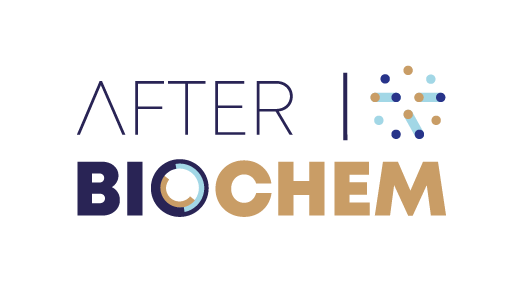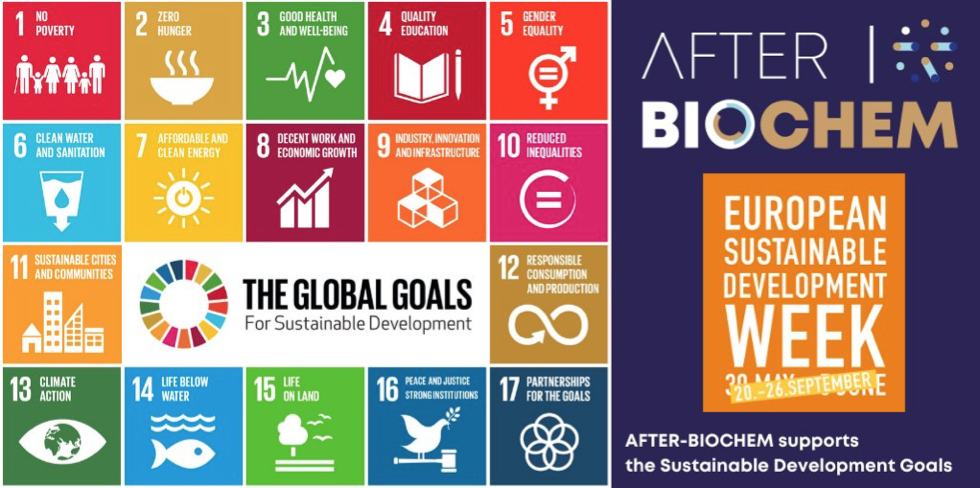AFTER-BIOCHEM’s Contribution to Sustainable Development
The “European Sustainable Development Week” (ESDW) is organised every year. From the 18th of September to the 8th of October 2020, more than 1000 events are planned over 15 EU countries. This year’s edition highlighted the United Nation “Sustainable Development Goals” (SDGs) and the role of European initiatives. The following article is describing how AFTER-BIOCHEM is contributing to sustainable development through the SDGs agenda.
What are the Sustainable Development Goals?
The Sustainable Development Goals (SDGs) also known as “The Global Goals for Sustainable Development” are a collection of 17 global goals designed to be a blueprint for achieving a better and more sustainable future for all. They address the global challenges we face, including poverty, inequality, climate change, environmental degradation, peace and justice. The SDGs, set in 2015 by the United Nations General Assembly and intended to be achieved by the year 2030, are part of a UN Resolution called “The 2030 Agenda”.
AFTER-BIOCHEM’s Contributions
Within the 17 SDGs, the AFTER-BIOCHEM Project notably contributes to four of them:
Goal 8: Promote inclusive and sustainable economic growth, employment and decent work for all

AFTER-BIOCHEM contributes to the SDG8 and more especially to the targets 8.2 (Achieve higher levels of economic productivity through innovation) and 8.5 (achieve full and productive employment and decent work for all women and men). Indeed, AFTER-BIOCHEM has the objective to create at least 50 direct jobs in the bioeconomy sector and more significantly in the manufacturing & construction/engineering sectors. Job creation will be completed with the implementation of a strategic recruitment plan, developed by the project coordinator AFYREN NEOXY, valorising: the local training, the labour market as well as industrial relationships.
Goal 9: Build resilient infrastructure, promote sustainable industrialisation and foster innovation

AFTER-BIOCHEM addresses directly to the target 9.4 (resource-use efficiency, environmental sound technologies and industrial processes) by developing the first of its kind flagship biorefinery in France. The flagship will turn agricultural processing co-products into a range of new natural & bio-based consumers products with applications in the Fragrances & Flavoring, Personal care, Food & Feed and industrial chemicals.
Besides, to valorise natural and renewable resources, the objective of AFTER-BIOCHEM, is to develop processes with reduced energy consumption and environmental impact by implementing a « zero-waste » strategy.
Goal 12: Ensure sustainable consumption and production patterns

AFTER-BIOCHEM also contributes to the 12.2 targets by proposing an efficient use of waste coming from key European crops such as sugar beet into a standard sugar refinery. Consequently, it will improve the economic and environmental sustainability of such crops. Furthermore, fossil-based raw materials are replaced by biobased raw materials, thus reducing the dependence on petrochemical-based ingredients for a range of molecules.
Last but not least, the AFTER-BIOCHEM project contributes to the 12.5 targets by implementing a “zero waste” strategy thanks to an optimised production process and the use of co-products in the form of fertilisers.
Goal 13: Take urgent action to combat climate change and its impacts

The use of bio-based materials such as the ones developed within AFTER-BIOCHEM in applications such as Fragrances & Flavoring, Personal care, Food & Feed and industrial chemicals instead of petroleum-based ones allows reducing CO2 & polluting emissions. Energy consumption during the manufacturing process will also decrease.

